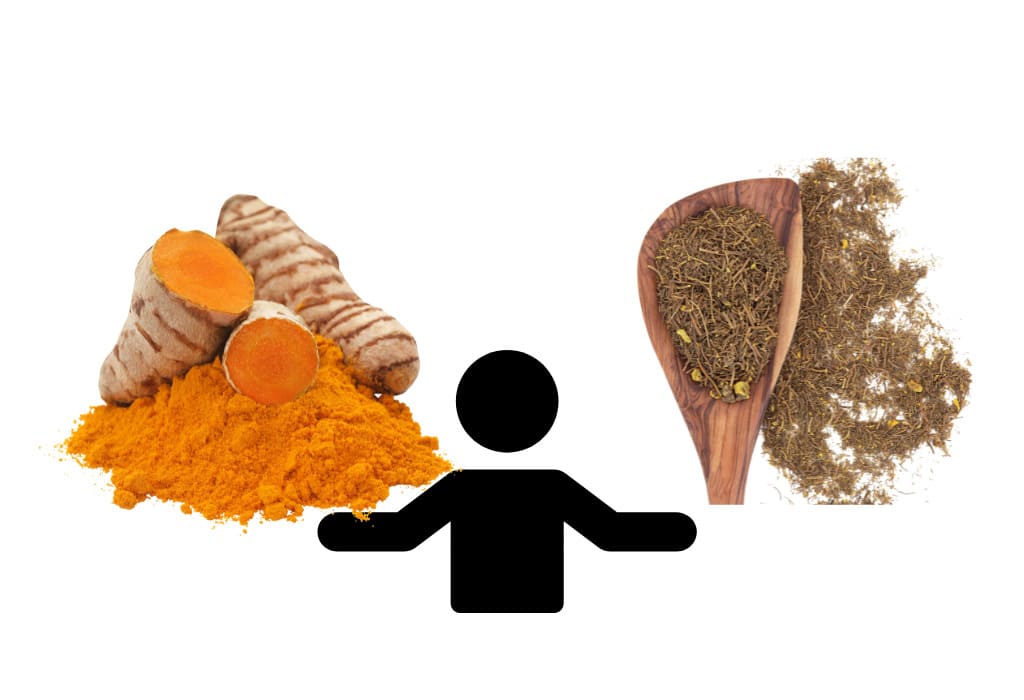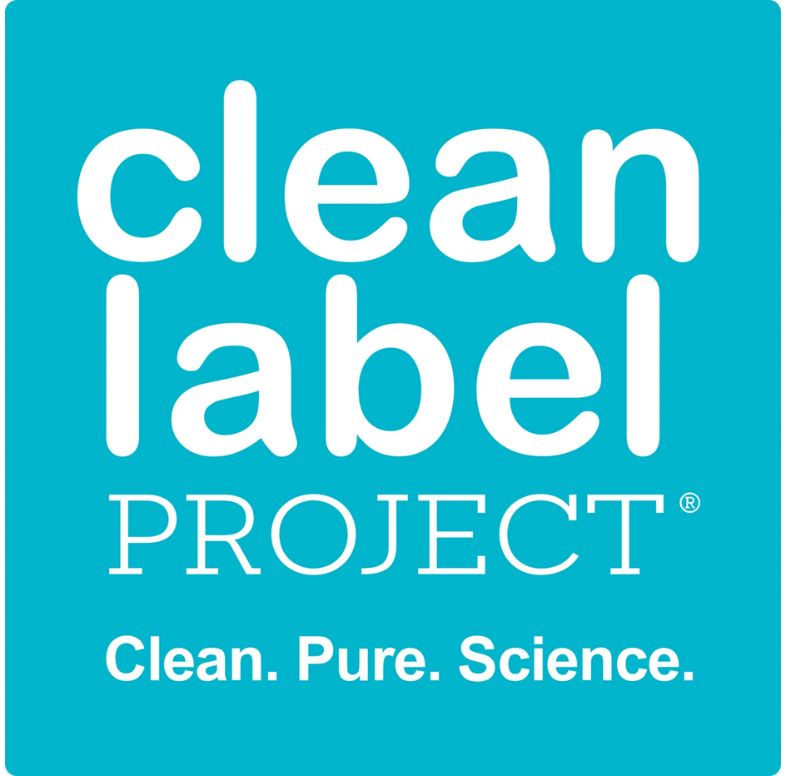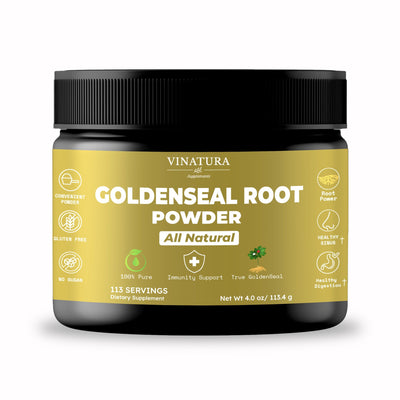
Turmeric and Goldenseal: Are They the Same or Different?
Although commonly referred to as "turmeric root," Goldenseal and Turmeric are separate entities with distinct scientific backgrounds and health advantages.
This article delves into their chemical compositions and medicinal attributes to clarify any confusion and educate our readers about these exceptional plants.
Before exploring further, please read the disclaimer located at the end of this webpage.
Turmeric and Goldenseal: Overview
Goldenseal
Goldenseal, scientifically identified as Hydrastis canadensis, is a perennial herb indigenous to the deciduous forests of northeastern North America. The chemical makeup of Goldenseal is intricate and varied.
Currently, researchers have pinpointed approximately 50 distinct compounds in the plant's stems and roots, encompassing iso-quinoline alkaloids like berberine, berberastine, tetrahydro berberastine, hydrastine, hydrastinine, canadine, and Canalidine [1, 3].
Notably, berberine, hydrastine, and canadine have attracted attention for their beneficial effects on health, digestive support, menstrual disorders, muscle support, and more [1, 2].
Despite the myriad advantages Goldenseal offers, users have reported some side effects.
Potential adverse reactions may involve damage to specific nerve cells, heightened oxidative stress, diminished cell membrane potential, lowered ATP levels, potential liver harm, and risks to the eyes and skin when applied topically [3].
Watch this video to explore everything about Goldenseal: benefits, side effects, uses:
Turmeric

Turmeric, also known as Curcuma longa, is a perennial herb from the ginger family, Zingiberaceae, extensively grown in Asia, particularly India and China.
Its rhizomes, a vital part of the plant, are utilized as a yellow powder in traditional and modern medicine and a spice in various cuisines.
The chemical makeup of Turmeric comprises curcuminoids, which consist of curcumin (diferuloylmethane), monodexmethoxycurcumin, and bisdesmethoxycurcumin, alongside volatile oils like tumerone, atlantone, and zingiberone.
Other components present are sugars, proteins, and resins. Curcumin, recognized as the most active compound, constitutes 0.3-5.4% of raw Turmeric [4].
Due to these constituents, Turmeric offers diverse benefits such as anti-inflammatory, antioxidant, liver support, stress support, joint support properties.
Furthermore, Turmeric positively impacts cardiovascular health and digestive and nervous system concerns [4].
Historically, using Turmeric has shown safety in numerous studies, with few severe side effects reported.
In an extensive review, some minor effects like digestive symptoms (nausea, constipation, diarrhea), headaches, drowsiness, high blood pressure, abdominal discomfort, cold sensations, bruising, fever, edema, throat infection, itching, dizziness, and hot flashes were mentioned [5].
These effects are often linked to the curcumin content, which, despite its significant health advantages, may not be suitable for everyone due to its robust nature.
Is Goldenseal the Same as Turmeric?

Despite occasional misconceptions and the overlap in some health benefits, Goldenseal and Turmeric stand as distinct entities.
Originating from different botanical families and geographic locations, each possesses unique chemical compositions that underlie their medicinal properties.
Goldenseal, native to the deciduous forests of North America, is prized for its iso-quinoline alkaloids, such as berberine and hydrastine, which contribute to its health effects on the digestive system and beyond.
In contrast, Turmeric, deeply rooted in Asian culture, owes its therapeutic prowess primarily to curcuminoids, with curcumin being the most significant.
This compound is responsible for Turmeric, antioxidants, and other diverse health benefits.
The pharmacological effects of these plants are determined by their unique chemical structures, underscoring the difference between the two when assessing their potential for health applications.
What is the Difference Between Turmeric and Goldenseal?
Turmeric and Goldenseal are completely different plants. Users can distinguish between them through several easily recognizable factors:
|
Turmeric |
Goldenseal |
|
|
Appearance |
The root of Turmeric has brown, yellow, or red hues. In dry powder form, Turmeric is fine and bright orange-yellow. |
Goldenseal is a perennial herb with a horizontal rhizome, yellow in color, thick with rough nodes. It has white flowers and can bear red fruit, similar to cranberries. |
|
Taste and smell |
Fresh turmeric has a slightly bitter taste and a mild pungent odor. |
Liquid extract of Goldenseal has a very bitter taste, which can be unpleasant for many users. |
|
Form |
|
Supplement: powder, liquid extract, alcohol extract |
|
Price |
Affordable |
Significantly higher than turmeric |
Table: The difference between Turmeric and Goldenseal
Goldenseal Vs. Turmeric: Which is Better?
Choosing between Goldenseal and Turmeric depends on various factors, such as individual health conditions and preferences.
Goldenseal is not generally recommended for pregnant women and children under 12 due to potential risks like miscarriage and limited safety data.
In contrast, Turmeric, a common spice in daily cooking, is a safer choice for most individuals. Incorporating a small daily dose of Turmeric into your diet is generally safe, whether as a supplement or in cooking.
In terms of personal preferences, both Goldenseal and Turmeric supplements are designed to be odorless and tasteless for easy consumption. However, if you opt for powdered forms, note that Turmeric's distinct smell may appeal to only some.
Turmeric is known for its mildness and health benefits with few adverse effects.
On the other hand, Goldenseal requires more caution due to its potent medicinal properties, which can lead to severe side effects and potential toxicity if not used carefully.
While both herbs offer health benefits, making the right choice should be based on carefully considering your specific health needs and preferences and prioritizing safety and well-being.
Can You Use Both Turmeric and Goldenseal at the Same Time?
Using both Turmeric and Goldenseal together is a way to combine their health benefits. However, it's essential to approach this cautiously due to their strong biological effects.
While there's no conflict in their benefits, and they can complement each other in therapy, Turmeric's safety profile makes it a better option for daily use.
Before adding these supplements, consulting a healthcare professional is wise to adjust the dosage based on your health needs. This ensures you get the most benefits with minimal risks, significantly when Turmeric and Goldenseal effects overlap without enhancing health outcomes.
Frequently Asked Questions
Are Goldenseal and Turmeric Safe to Use?
Both Goldenseal and Turmeric are generally considered safe for most people when used in appropriate dosages. However, some individuals might experience minor side effects like dizziness, nausea, and diarrhea. If side effects persist, discontinuing the supplement is advised for safety.
Goldenseal Vs. Turmeric: What Should You Choose?
When choosing between Goldenseal and Turmeric, consider their side effects. Turmeric is known for its fewer side effects, making it a better choice for many. Its mildness and safety also support broader daily use, whether in cooking or as a supplement. Turmeric is the preferred option for a health-boosting herb with minimal adverse effects.
How Should You Take Golden Seals and Turmeric?
Incorporating 1000mg of Goldenseal supplement daily can be paired with using Turmeric as a spice in meals to benefit from both herbs effectively. Goldenseal offers concentrated medicinal benefits, while Turmeric adds a healthy touch to your diet.
Conclusion
Goldenseal and Turmeric play significant roles in natural health remedies, each offering unique benefits tailored to specific needs and conditions.
Turmeric's broad safety profile and gentle nature make it an ideal daily supplement, while Goldenseal requires careful use due to potential internal toxicity risks.
It emphasizes the importance of adhering to recommended dosages and cycle-off periods.
The choice between them depends on individual health goals and tolerances, highlighting the necessity of making an informed decision to maximize health benefits while minimizing potential risks.
References
- [1] Burkhart, E. P., & Zuiderveen, G. H. (2019). Wild Goldenseal (Hydrastis canadensis) Rhizome/Root Alkaloid Content in Relation to Colony and Harvest Stage. Journal of Herbs, Spices & Medicinal Plants, 25(2), 128–140. https://doi.org/10.1080/10496475.2019.1577322
- [2] Mahady, G. B., & Chadwick, L. R. (2001). Goldenseal (Hydrastis canadensis): Is There Enough Scientific Evidence to Support Safety and Efficacy?. Nutrition in Clinical Care, 4(5), 243–249. https://doi.org/10.1046/j.1523-5408.2001.00004.x
- [3] Mandal, S. K., Maji, A. K., Mishra, S. K., Ishfaq, P. M., Devkota, H. P., Silva, A. S., & Das, N. (2020). Goldenseal (Hydrastis canadensis L.) and its active constituents: A critical review of their efficacy and toxicological issues. Pharmacological Research, 160, 105085. https://doi.org/10.1016/j.phrs.2020.105085
- [4] Labban, Louay. (2014). Medicinal and pharmacological properties of Turmeric (Curcuma longa): A review. Int J Pharm Biomed Sci.. 5. 17-23.
- [5] Rolfe, V., Mackonochie, M., Mills, S., & MacLennan, E. (2020). Turmeric / curcumin and health outcomes: A meta-review of systematic reviews. European Journal of Integrative Medicine, 40, 101252. https://doi.org/10.1016/j.eujim.2020.101252
Author

Product Disclaimer
Including an ingredient or study does not evaluate, endorse, or recommend any Vinatura product or any third-party product. Some ingredients discussed may not be used in any Vinatura product.
The content of the articles has not been evaluated by the Food and Drug Administration (FDA) and is not intended to promote or endorse any specific product. Any products sold on this website are not intended to diagnose, treat, cure, or prevent any disease.
Opinions and Endorsements
Any claims, statements, or opinions expressed in the articles are those of the author(s) and do not necessarily reflect the views or opinions of the manufacturers of the dietary supplement products. The products sold on this website are separate from the content of the articles and are not directly endorsed or associated with the information presented here.
Liability Disclaimer
The author(s) of the articles, website, and manufacturers of the dietary supplement products do not assume any liability for any potential consequences arising from the use of the information provided in the articles. Ingredient effects, dosages, and safety vary by individual, formulation, and context; some ingredients interact with medications or may be unsuitable during pregnancy or lactation. It is recommended that individuals consult with a qualified healthcare professional before making any dietary or lifestyle changes, including the use of dietary supplements.
Product Usage
Please refer to the product labels and packaging for specific usage instructions and guidelines for the dietary supplement products sold on this website.
Customer Support
For any concerns or questions regarding the dietary supplement products, please contact our customer support team, who will be more than happy to assist you.






Leave a Comment
Be the first to comment.
What do you think?